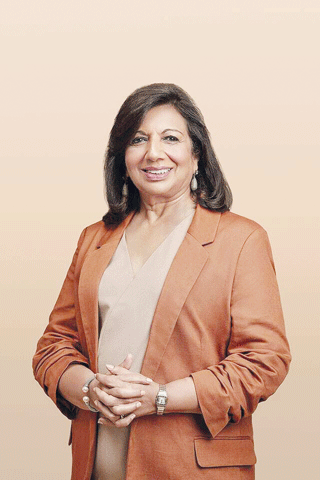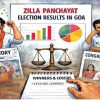Goa is abuzz with excitement as vintage bike and car owners, users, collectors and fans are decking […]

BIOCON MD DECRIES HATE CAMPAIGN! By GURBIR SINGH
April 09- April 15 2022, In the News April 8, 2022HATE: The Banjrang Dal and other fanatical Hindutva organisations like Ram Sene are attacking not only Muslims selling halal meat but even restaurants selling halal food.
Managing Director of Biocon limited and Padmashree winner Kiran Mazumdar Shaw has expressed distress about the hate campaign in Karnataka and other BJP ruled states. In Karnataka the Bajrang Dal has now started an anti-halal campaign. In many BJP-ruled states fanatic Hindutva affiliates of the RSS are asking Hindus not to patronise shops run by Muslims near places of worship.
By Gurbir Singh
Business, in matters of politics, is generally conservative. And rightly so. Business interests are best served if civil society is stable, and there is no disturbance to normal commerce and other market activity. Lending support to the government in power, therefore, is a normal corollary, and it is not uncommon for leading business persons singing paeans to an Indira Gandhi or to Prime Minister Narendra Modi.
It was, therefore, surprising that in recent days, Biocon’s articulate executive chairperson Kiran Mazumdar-Shaw courted controversy. In a series of tweets, she appealed to Karnataka CM Basavaraj Bommai to call a halt to the boycott of Muslim traders at religious fairs in the temple towns of Dakshina Kannada and Shivamogga.
Temple events are not just religious occasions but often a market place built around the gathering of communities. Muslim vendors have for long been active at these gatherings, and an attempt to stop normal commerce by right-wing Hindu groups found condemnation even from a couple of BJP legislators. Tangentially, Mazumdar-Shaw was warning that the “growing religious divide” in Karnataka was hurting business and that India’s ‘global leadership’ in IT and biotech was being threatened. Polarising communities into Hindus and Muslims pays rich political dividends. On the other hand, low-intensity communalism paralyses trade, and discourages fresh investment.
Important voices
Most businessmen will not comment on these issues for fear of reprisal, but there is the occasional ‘rebel’. Deepak Parekh, chairman of HDFC, seeing the tragedy of the Gujarat communal riots in 2002, and the deliberate failure of the police to stop rampaging Hindu mobs, let out a cry of protest. In a statement of 26 March, 2002, he said, “Internationally, we have lost our name as a secular country…If politicians have prevented the police from doing their duties, it cannot be tolerated. Some heads have to roll.”
Later, the banker made peace with the then Gujarat Chief Minister Narendra Modi, and by 2012 was celebrating his third term in the state. However, his statement on the Gujarat communal conflagration was a business statement too – that India as an investment destination was taking a knock.Businesspersons have also been perturbed at the blocking of communication lines with the government, and the failure of the political leadership to appreciate critical views. These are mostly voiced in private, but there is that occasional strong dissenting voice.
The late Rajul Bajaj of Pune’s Bajaj Industries was one such voice. With Union Home Minister Amit Shah in the chair at a business daily’s event in December 2019, Bajaj said: “This atmosphere… it is certainly on our minds. Nobody will say…our industrialist friends will not say it. I will say that openly. An environment should be created. You are doing good work but if we criticise you there is no confidence that you will appreciate that.”
Amit Shah denied there was “an atmosphere of fear in the country” but the signal from the political class is that India Inc should stay in line. For instance, In August last year, Union Commerce and Industry Minister Piyush Goyal let go an unprovoked tirade at a CII meet alleging Indian industry was working against ‘national interest’. Special harsh words were reserved for Tata Sons.
Decimating the ‘cow’ economy
To return to our original topic – that of pushing out small Muslim vendors and businesses – is unfortunately a long-term agenda of the extreme right, and it is unlikely that voices such as Kiran Mazumdar-Shaw are likely to cut much ice. The ruin of the dairy economy in Uttar Pradesh and elsewhere in the name of cow protection is a case in point.
In the old cycle, when a milch cow ‘dries up’ after a life span of 8-9 years, the farmer would sell his aged livestock and use the money to renew his herd. The aged stock used to go to the abattoir for meat and skin for the leather industry. However, with the ban on slaughter in most states, abattoirs have been shut down and aging cattle are being abandoned as farmers cannot take care of them.
At the other end, the leather industry is in the doldrums. The systematic choking of what was Kanpur’s robust tannery industry illustrates a destructive agenda at work. Starting with 2018, the Uttar Pradesh Pollution Control Board (UPPCB) and the ‘Jal Nigam’ have worked in tandem to ensure a thriving industry is run to the ground. In the Jajmau area of Kanpur, the number of tanneries has come down to 270 from the earlier 410 in 2018. Most of these businesses are Muslim-owned.
The politics of religion is forcing a heavy price. Thousands are thrown out of work, and a lucrative export business has gone into oblivion. In this context, even if there are only a few voices like Mazumdar-Shaw, they are important. Rather than being extinguished, as they usually are, hopefully they will find more resonance.
Courtesy:
New Indian Express














